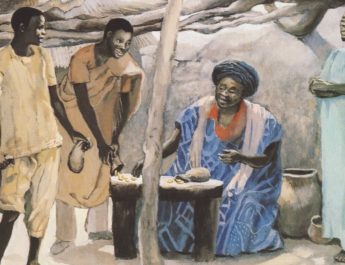Wisdom of Solomon 5:1-5 & 6:6-7
Easter Vigil – A Women’s Lectionary
Text: https://www.bible.com/bible/303/WIS.5.CEVDCI & https://www.bible.com/bible/303/WIS.6.CEVDCI
Interlinear: https://biblebento.com/index.html?lxx1i&270.5.1 & https://biblebento.com/index.html?lxx1i&270.6.1
5:1 But allA who have pleasedB God
will standC with confidenceD
A “all” = polus. This is much, often, plenteous – a large number or a great extent.
B “pleased” = dikaios. From dike (the principle of justice; that which is right in a way that is very clear; a decision or the execution of that decision; originally, this word was for custom or usage; evolved to include the process of law, judicial hearing, execution of sentence, penalty, and even vengeance; more commonly, it refers to what is right); may be from deiknumi (to show, point out, exhibit; figurative for teach, demonstrate, make known). This is correct, righteous, just, or a righteous person. It implies innocent or conforming to God’s standard of justice.
C “stand” = histemi. This is to stand, place, establish, appoint, stand ready, be steadfast.
D “confidence” = parresia. From pas (all, every, each) + rhesis (speech); {from rheo (say, speak of, command)}. This is confidence, openness, boldness, outspokenness. It can imply assurance – free speech.
in the presenceE of those
who abusedF them and made fun
ofG the good they did.H
E “presence” = prosopon. From pros (at, towards, with) + ops (eye, face); {from optanomai (to appear, be seen); perhaps from horao (become, seem, appear)}. This is the face, surface, or front. It can imply presence more generally.
F “abused” = thlibo. 10x in NT. Perhaps from tribos (worn track or path like a rut that is formed from rubbing i.e. steady use; also road or highway); from tribo (to rub or thresh). This is to press in on and make narrow, rub together, constrict. Figuratively, it is to oppress or afflict.
G “made fun of” = atheteo. 16x in NT. From athetos (not having position or place); {from a (not) + tithemi (to put, place, set, fix, establish in a literal or figurative sense; properly, this is placing something in a passive or horizontal position)}. This is setting something aside, ignoring or nullifying it, refusing or rejecting. It can also mean to annul or cancel out the effect of something. Literally, this is to un-place. It can also be rejecting something, despising it, or considering something invalid.
H “did” = ponos. 4x in NT– 1x in Colossians & 3x in Revelation. From the base of penes (a laborer, poor person, starving or indigent person; someone who works for their living); from pernomai (working for a living; laborer, poor person; to work for daily bread); from peno (to toil to survive day by day). This is labor, anguish, suffering, pain.
2 When those evil onesI seeJ
how God has savedK his people,
I “evil ones” = paradoxos. 1x in NT. From para (beside, by, in the presence of) + doxa (glory, opinion, praise, honor, renown; particularly used as a quality of God or manifestation of God – splendor); {from dokeo (to have an opinion, seem, appear, suppose; a personal judgment; to think); from dokos (opinion)}. This is different from expectations, strange, a paradox. It is where “paradox” comes from.
J “see” = horao. Related to “presence” in v5:1. See note E above.
K “saved” = soteria. From soter (a savior, deliverer); from sozo (to save, heal, preserve, or rescue; taking someone from danger to safety; delivering or protecting literally or figuratively); from sos (safe, rescued, well). This is deliverance, salvation, preservation, welfare, prosperity, safety.
they will trembleL with fearM
and be completelyN amazed.O
L “tremble” = tarasso. 18x in NT. This is trouble, agitate, stir up. It is motion back and forth, creating inner turmoil or confusion, roiling water.
M “fear” = phobos. From phebomai (to flee, withdraw, be put to flight). This is panic flight, fear, fear being caused, terror, alarm, that which causes fear, reverence, respect.
N “completely” = deinos. 2x in NT. From the same as deilos (fearful, timid, faithless, fear of losing); from deos (fear, reverence); from deido (to fear). This is terribly, very, excessively.
O “amazed” = existemi. Related to “stand” in v5:1. 17x in NT. From ek (from, from out of) + histemi (see note C above). This is to displace or take something or someone from standing. Figuratively, it is to be overwhelmed and flabbergasted – as if beside oneself. By extension, it is astonished, amazed, or mad.
3 They will groanP and sayQ
to each other,
“We should have turned from sin!R
P “groan” = stenochoria + pneuma + stenazo. Stenochoria is 4x in NT. From stenos (narrow, confined) + chora (space, area). This is a narrow space – used figuratively for a difficulty coming from external pressure. It is distress, difficulty, or anguish. Pneuma is from pneo (to blow, breath, breathe hard). This is wind, breath, or ghost. A breeze or a blast or air, a breath. Figuratively used for a spirit, the human soul or part of us that is rational. It is also used supernaturally for angels, demons, God, and the Holy Spirit. This is where pneumonia comes from. Stenazo is related to “stand” in v5:1 & “amazed” in v5:2. 6x in NT. From steno (to sigh, groan) OR from stenos (narrow, confined); {probably from histemi (see note C above)}. This is to groan from grief or longing or pain/pressure. It can be a positive or negative experience related to pressure with forward momentum.
Q “say” = lego. This is to speak, say, name, call, command. It is generally to convey verbally.
R “turned from sin” = metanoeo. From meta (with, among, after, beyond) + noieo (to perceive, think, understand); {from nous (mind, understanding, reasoning faculty, intellect, capacity to reflect)}. This is to change how one thinks, to reconsider, to repent. It refers to a change of thinking, which means a change of purpose and behavior.
4 We were foolsS to sneerT
at those people,U
S “fools” = aphron. 11x in NT. From a (not, without) + phren (diaphragm, heart, intellect, understanding; figurative for personal opinion or inner mindset; thought regulating action; sympathy, feelings, cognition); {perhaps from phrao (to rein in or curb)}. This is not having reason – foolish, unperceptive, unwise. It denotes short-sightedness and lack of perspective, which leads one to act without prudence. It is not grasping cause and effect, even willful ignorance. It implies being rash or egotistical.
T “sneer” = eis + gelos + kai + eis + parabole + oneidismos. Gelos is 1x in NT. From gelao (to laugh or smile). This is laughter. Parabole is from paraballo (literally to throw beside, compare, arrive, liken); {from para (by, beside, in the presence of) + ballo (to throw, cast, place, put, drop)}. This is a parable, comparison, adage. Quite often a tale told or a metaphor to establish a point, but it could be a true story. Oneidismos is relate to “turned from sin” in v5:3. 5x in NT. From oneidizo (to disgrace, insult, mock, blame, or curse someone so as to create shame; when a person or thing is considered guilty and deserving punishment; denounce, revile, defame, or chide); from oneidos (a personal disgrace that leads to harm to one’s reputation, a taunt or reproach); perhaps from the base of onoma (name, authority, cause, character, fame, reputation); perhaps from ginosko (know, recognize, learn from firsthand experience). This is reproach or an insult that harms reputation.
U “people” = bios. 10x in NT– including the widow’s mite story where she gave all she had to live on in Mark 12:44 and Luke 21:4. This is physical life, livelihood, goods, or the way one lives one’s life.
but we thoughtV they were foolsW
who had diedX in disgrace.Y
V “thought” = logizomai. Related to “say” in v5:3. From logos (word, statement, speech, analogy; here, word as an account or accounting; can also be a word that carries an idea or expresses a thought, a saying; a person with a message or reasoning laid out in words; by implication, a topic, line of reasoning, or a motive; can be used for a divine utterance or as Word – Christ); from lego (see note Q above). This is this is to compute or reckon up, to count; figuratively, it is coming to a conclusion or decision using logic; taking an inventory in a literal or figurative sense.
W “fools” = mania. 1x in NT. From mainomai (to be insane, to rage; behaving like one has lost their mind, but only on a temporary basis); from mao (long for). This is frenzy or madness. It is where the word “mania” comes from.
X “died” = teleute.1x in NT. From teleutao (to complete or come to the end/end goal; to finish life or to meet one’s ultimate fate in heaven or hell); from teleo (to complete, fulfill, accomplish, end); from telos (an end, aim, purpose, completion, end goal, consummation, tax; going through the steps to complete a stage or phase and then moving on to the next one). This is an end or closure. It could also refer to death.
Y “disgrace” = atimos. 4x in NT. From a (not, without) + time (worth or something’s perceived value; literally, price, but figuratively, the honor or value one sees in someone or something else; also esteem or dignity; also precious or valuables); {from tino (to pay, be punished, pay a penalty or fine because of a crime); from tio (to pay respect, value)}. This is without honor, despised, not valued, not recognized.
5 Why are they God’sZ children?AA
Why are they his holyBB people?CC
Z “God’s” = Theos. From Proto-Indo-European origins, meaning do, put, place. This is God or a god in general.
AA “children” = huios. This is son, descendant – a son whether natural born or adopted. It can be used figuratively for other forms of kinship.
BB “holy” = hagios. From hagnos (holy, sacred, pure ethically, ritually, or ceremonially; prepared for worship, chaste, unadulterated, pure to the core; undefiled by sin; figurative for innocent, modest, perfect). God is totally different from humanity and thus set apart. That which is consecrated to worship God (elements of worship) or to serve God (as the saints) are holy because they are now set apart for God’s purposes. Holy because important to God. This is sacred physically, pure. It can be morally blameless or ceremonially consecrated.
CC “people” = kleros. 12x in NT. Perhaps from klero (casting a lot) or from klao (to break in pieces as one breaks bread). This lot, portion, heritage. It is that share assigned to you. It could also refer to a lot used to determine something by fate, chance, or divine will.
6:6 God forgivesDD ordinaryEE people,
but severely punishesFF
the highGG and the mighty.HH
DD “forgives” = eleos. This is mercy, pity, tender mercy, or compassion, whether from humans or from God. This is mercy, generally understood in action by word or deed. When we sing or say “kyrie eleison” (Lord, have mercy), it is related to this word.
EE “ordinary” = elachistos. 13x in NT. From elachus (short); used as a superlative for mikros (small). This is smallest or littlest in the sense of size, amount, rank, dignity, and so on.
FF “severely punishes” = etazo. This is to test or torment.
GG “high” = dunateo. 3x in NT. From duantos (mighty or powerful; ability of persons, possibility of things; what can be given the power or ability that the subject exhibits); from dunamai (to be able, have power or ability). This is to be able or powerful. It is using power that cannot be stopped. It is the same root as the Greek word for “miracle.”
HH “mighty” = dunatos. Related to “high” in v6:6. See note FF above.
7 The Lord createdII everyoneJJ—
the powerfulKK and the weak.LL
II “created” = poieo. This is to make, do, act, construct, abide, or cause.
JJ “everyone” = pas. This is all or every.
KK “powerful” = megethos. 1x in NT. From megas (big in a literal or figurative sense – great, large, exceeding, abundant, high, mighty, perfect, strong, etc.). This is vastness or greatness.
LL “weak” = mikros. This is small in reference to a size or the number of something, least or less. Figuratively, it can refer to little dignity.
GodMM hasNN no favorites;OO
he isn’t afraidPP of anyone,
MM “God” = despotes. Perhaps from deo (to tie, bind, compel; declare unlawful). This is lord, master, despot, sovereign Lord. It is an authority who has unrestricted power and jurisdiction.
NN “has” = hupostello...pronoeo. Hupostello is 4x in NT. From hupo (by, under, about, subordinate to) + stello (to set, arrange, prepare, provide for). This is to draw under, withdraw, conceal, shrink back, back off, reserve. Pronoeo is 3x in NT. From pro (before, first, in front of, earlier) + noeo (to think, understand, conceive, realize, see; one who thinks things through sufficiently to reach a conclusion or value judgment; moral reasoning.); {from nous (mind, understanding, reasoning faculty, intellect, capacity to reflect); from noos (mind); probably from the base as ginosko (see note T above)}. This is literally to think of ahead of time so it is to practice, plan, foresee, respect, regard.
OO “favorites” = prosopon. Same as “presence” in v5:1. See note E above.
PP “afraid” = entrepo. 9x in NT. From en (in, on, at, by, with) + trepo (to turn; may imply turn with change). This is to turn. It could be to turn to pay rapt attention to, to turn in shame, recoil, or to turn to in respect.
Note: This passage comes from the apocrypha so I was not able to use my regular interlinear website. Some of this annotation amounts to guesswork and uses many other sources. However, most of it is still based on Strong’s concordance.
Image credit: “The Face of Horror and Shame” by Leonard J Matthews, 2013.




